- Home
- Martin Amis
Time's Arrow
Time's Arrow Read online
ALSO BY MARTIN AMIS
Fiction
The Rachel Papers
Dead Babies
Success
Other People
Money
Einstein’s Monsters
London Fields
The Information
Night Train
Heavy Water and Other Stories
Nonfiction
Invasion of the Space Invaders
The Moronic Inferno and Other Visits to America
Visiting Mrs. Nabokov and Other Excursions
Experience
The War Against Cliché
Koba the Dread
Praise for
Martin Amis’s
TIME’S ARROW
“A … novel that seems to have been written with the term ‘tour de force’ in mind … a brilliant job.”
—Village Voice Literary Supplement
“A breakthrough … etched with acid irony and trickery … To submit to [Amis’s] comic tweaking and tickling is to abet the inevitable logic of his assault on our senses.… Time’s Arrow, his tautest and sleekest novel yet, is also his most wide-angled and farsighted … a hard look at our dark age through glittering alien eyes.”
—Boston Phoenix Literary Section
“A brilliantly imaginative feat.”
—Mirabella
“Audacious, utterly poised and almost moving … the book’s devastatingly sustained black irony stands comparison with Swift’s A Modest Proposal. It is … Amis’s finest achievement to date.”
—Financial Times
“Amis can write prose that is spikily, nervously elegant, full of urgency and surprise.”
—New York
“Prodigious cleverness … a brilliant book.”
—Vogue
MARTIN AMIS
TIME’S ARROW
Martin Amis is the bestselling author of several books, including London Fields, Money, The Information, and Experience. He lives in London.
FIRST VINTAGE INTERNATIONAL EDITION, OCTOBER 1992
Copyright © 1991 by Martin Amis
All rights reserved under International and Pan-American Copyright Conventions. Published in the United States by Vintage Books, a division of Random House, Inc., New York. Originally published in Great Britain by Jonathan Cape Limited in 1991.
First published in the United States by Harmony Books,
a division of Crown Publishers, Inc., New York, in 1991.
Library of Congress Cataloging-in-Publication Data
Amis, Martin.
Time’s arrow, or, The nature of the offense / Martin Amis.—1st
Vintage International ed.
p. cm.
Originally published: London: Jonathan Cape Limited, 1991.
eISBN: 978-0-307-77777-5
I. Title.
PR6051.M5T5 1992
823′.914—dc20 91-51128
Author photograph © Jerry Bauer
v3.1
to Sally
CONTENTS
Cover
Other Books by This Author
About the Author
Title Page
Copyright
Dedication
Part I
1: What goes around comes around
2: You have to be cruel to be kind
3: Because I am a healer, everything I do heals
Part II
4: You do what you do best, not what’s best to do
5: Here there is no why
6: Multiply zero by zero and you still get zero
7: She loves me, she loves me not
Part III
8: Because ducks are fat
Afterword
PART 1
1
What goes around comes around
I moved forward, out of the blackest
sleep, to find myself surrounded by
doctors … American doctors:
I sensed their vigor, scarcely held in check, like the profusion of their body hair; and the forbidding touch of their forbidding hands—doctor’s hands, so strong, so clean, so aromatic. Although my paralysis was pretty well complete, I did find that I could move my eyes. At any rate, my eyes moved. The doctors seemed to be availing themselves of my immobility. They were, I sensed, discussing my case, but also other matters having to do with their copious free time: hobbies, and so on. And the thought came to me, surprising in its fluency and confidence, fully formed, fully settled: How I hate doctors. Any doctors. All doctors. Consider the Jewish joke, with the old lady running distractedly along the seashore: Help! My son the doctor is drowning. Amusing, I suppose. Her pride, I suppose, is amusing: it is greater than her love. But why the pride in these doctor children (why not shame, why not incredulous dread?): intimates of bacilli and trichinae, of trauma and mortification, with their disgusting vocabulary and their disgusting furniture (the bloodstained rubber bib, hanging on its hook). They are life’s gatekeepers. And why would anyone want to be that?
The doctors around my bed were, of course, in leisurewear; they sent off a fuzz of suntanned self-possession, together with the unanimity that comes from safety in numbers. Given my circumstances, I might have found their manner insultingly casual. Yet I was reassured by the very vapidity of these doctors or joggers or bodybuilders, these vigor-experts—something to do with their unsmiling pursuit of the good life. The good life, at least, is better than the bad life. It features windsurfing, for example, and sweet deals in futures, and archery, and hang gliding, and fine dining. In my sleep I had dreamed of a … No, it wasn’t like that. Let me put it this way: presiding over the darkness out of which I had loomed there was a figure, a male shape, with an entirely unmanageable aura, containing such things as beauty, terror, love, filth, and above all power. This male shape or essence seemed to be wearing a white coat (a medic’s stark white smock). And black boots. And a certain kind of smile. I think the image might have been a ghost-negative of doctor number one—his black tracksuit and power-pack plimsolls, and the satisfied wince he gave as he pointed at my chest with a shake of his head.
Time now passed untrackably, for it was given over to struggle, with the bed like a trap or a pit, covered in nets, and the sense of starting out on a terrible journey, toward a terrible secret. What did the secret have to do with? Him, with him: the worst man in the worst place at the worst time. I was definitely becoming stronger. My doctors came and went, with heavy hands and heavy breath, to admire my new gurgles and whimpers, my more spectacular twitches, my athletic jolts. Often, a nurse was there, alone, in adorable vigil. Her cream uniform made a packety sound—a sound in which, I felt, I could repose all my yearning and my trust. Because by this stage I was remarkably improved, feeling really tip-top. Never better. Sensation and all its luxuries returned first to my left side (suddenly) and then to my right (with gorgeous stealth). I even won praise from the nurse by lithely arching my back, more or less unassisted, when she did her thing with the pan.… Anyway, I lay there, in a mood of quiet celebration, for however long it was, until the evil hour—and the orderlies. The golfing doctors I could handle, the nurse was an unqualified plus. But then came the orderlies, who dealt with me by means of electricity and air. There were three of them. They were unceremonious. They hurried into the room and bundled me into my clothes and stretchered me into the garden. That’s right. Then with the jump leads, like two telephones (white—white-hot), they zapped my chest. Finally, before they went away, one of them kissed me. I think I know the name of this kiss. It is called the kiss of life. Then I must have blacked out.
And when I came to it was with an audible pop in the ears, and a rich consciousness of solitude, and a feeling of love and admiration for this big stolid body I was in, which even now was preoccupied and unconcerned, st
raining out over the rose bed to adjust a loose swathe of clematis on the wooden wall. The big body pottered on, with slow competence: yes, it really knows its stuff. I kept wanting to relax and take a good look at the garden—but something isn’t quite working. Something isn’t quite working: this body I’m in won’t take orders from this will of mine. Look around, I say. But his neck ignores me. His eyes have their own agenda. Is it serious? Are we okay? I didn’t panic. I made do with peripheral vision, which, after all, is the next best thing. I saw curled flora swooping and trembling, like pulses or soft explosions in the side of the head. And a circumambient pale green, barred and embossed with pale light, like … like American money. I pottered on out there until it began to get dark. I dumped the tools in the hut. Wait a minute. Why am I walking backward into the house? Wait. Is it dusk coming, or is it dawn? What is the—what is the sequence of the journey I’m on? What are its rules? Why are the birds singing so strangely? Where am I heading?
A routine, in any event, has certainly established itself. It seems I’m getting the hang of things.
I live, out here, in washing-line and mailbox America, innocuous America, in affable, melting-pot, primary-color, You’re-okay-I’m-okay America. My name, of course, is Tod Friendly. Tod T. Friendly. Oh, I’m there, I’m there in Salad Days, or outside Hank’s Hardware World or on the patch of grass by the white town hall, with my chest thrust out and hands on hips and a kind of silent ho-ho-ho. Because that’s the kind of guy I am. I’m there—I’m there at the produce store, at the post office, with my “Hi” and my “Bye now” and my “Good. Good.” But it doesn’t quite go like that. It goes like this:
“Dug. Dug,” says the lady in the pharmacy.
“Dug,” I join in. “Oo y’rrah?”
“Aid ut oo y’rrah?”
“Mh-mm,” she’ll say, as she unwraps my hair lotion. I walk away, backward, with a touch of the hat. I speak without volition, in the same way that I do everything else. To tell the truth, it took me quite a while to realize that the pitiable chirruping I heard all about me was, in fact, human speech. Christ, even the larks and the sparrows sound more dignified. I translate this human warble, out of interest. I soon picked it up. I know I’m fluent, now, because I can dream in it. There’s another language, a second language, here in Tod’s head. We sometimes dream in that language too.
But, yes, here we go, trimly hatted, finely shod, with the Gazette tucked under the arm, past the little driveways (THICKLY SETTLED), the lettered mailboxes (Wells, Cohen, Rezika, Meleagrou, Klodzinski, Schering-Kahlbaum, and I don’t know what-all), the quiet ambition of every homestead (Please Respect Owner’s Rights), the kid-filled buses and the yellow sign saying SLOW—CHILDREN and the black shape of that precipitate youngster with his clutched schoolbag (of course he’s not looking. He’s busy running. The face, the eyes, are downward slanted. He has no mind for cars: only for the rightful exercise of his earthly powers). When the little ones squeeze past me in the Superette, I give their mops the chaste old tousle. Tod Friendly. I have no access to his thoughts—but I am awash with his emotions. I am like a crocodile in the thick river of his feeling tone. And you know what? Each glance, each pair of eyes, even as they narrow in ingenuous appraisal, draws a bead on something inside him, and I sense the heat of fear and shame. Is that what I’m heading toward? And Tod’s fear, when I stop and analyze it, really is frightening. And inexplicable. It has to do with his own mutilation. Who might commit it? How can he avert it?
Watch. We’re getting younger. We are. We’re getting stronger. We’re even getting taller. I don’t quite recognize this world we’re in. Everything is familiar but not at all reassuring. Far from it. This is a world of mistakes, of diametrical mistakes. All the other people are getting younger too, but they don’t seem to mind, any more than Tod minds. They don’t find it counterintuitive, and faintly disgusting, as I do. Still, I’m powerless, and can do nothing about anything. I can’t make myself an exception. The other people, do they have someone else inside them, passenger or parasite, like me? They’re lucky. I bet they don’t have the dream we have. The figure in the white coat and the black boots. In his wake, a blizzard of wind and sleet, like a storm of human souls.
Each day, when Tod and I are done with the Gazette, we take it back to the store. I have a good look at the dateline. And it goes like this. After October 2, you get October 1. After October 1, you get September 30. How do you figure that?… The mad are said to keep a film or stage set in their heads, which they order and art-decorate and move through. But Tod is sane, apparently, and his world is shared. It just seems to me that the film is running backward.
I’m not a complete innocent.
For instance, I find I am equipped with a fair amount of value-free information, or general knowledge, if you prefer. E = mc2. The speed of light is 186,000 miles per second. It ain’t slow. The universe is finite yet boundless. As for the planets, it’s Mercury, Venus, Earth, Mars, Jupiter, Saturn, Uranus, Neptune, Pluto—poor Pluto, subzero, subnormal, made of ice and rock, and so far away from the warmth and the shine. Life is no bowl of cherries. It’s swings and roundabouts. You win some, you lose some. It evens out. It measures up. What goes around comes around. 1066, 1789, 1945. I have a superb vocabulary (monad, retractile, necropolis, palindrome, antidisestablishmentarianism) and a nonchalant command of all grammatical rules. The apostrophe in “Please Respect Owner’s Rights” isn’t where it ought to be. (Nor is the one in the placard on Route 6 that locates and praises “Rogers’ Liquor Locker.”) Apart from words denoting motion or process, which always have me reaching for my inverted commas (“give,” “fall,” “eat,” “defecate”), the written language makes plain sense, unlike the spoken. Here’s another joke: “She calls me up and says, ‘Get over here. There’s nobody home.’ So I get over there, and guess what. There’s nobody home.” Mars is the Roman god of war. Narcissus fell in love with his own reflection—with his own soul. If you ever close a deal with the devil, and he wants to take something from you in return—don’t let him take your mirror. Not your mirror, which is your reflection, which is your double, which is your secret sharer. The devil has something to be said for him: he acts on his own initiative, and isn’t just following orders.
No one could accuse Tod Friendly of being in love with his own reflection. On the contrary, he can’t stand the sight of it. He grooms himself by touch: he favors an electric razor and does his own barbering with a brutal pair of kitchen scissors. God knows what he looks like. There are several mirrors in our house, as you would expect, but he never confronts or consults them. I get the occasional hint from a darkened store window; sometimes, also, a chance distortion in the burnish of a faucet, of a knife. It has to be said that my curiosity is heavily qualified by trepidation. His body is not all that promising: the epic blemishes on the back of the hands, the torso loosely robed in flesh smelling of poultry and peppermint, the feet. We come across some fine old Americans in the avenues of Wellport, keglike granddads and strapping sea dogs, who are “marvelous.” Tod’s not marvelous. Not yet. He’s still pretty wrecked, all bent and askance and ashamed. And his face? Well, it happened, one night, between bad dreams. He had inched his way to the dark bathroom, and stood slumped over the sink, feeling lost, depersonalized, and trying to soothe or tether himself with the running water. Tod moaned, and straightened before the dark mirror, and reached for the switch. Easy does it, I thought. It would have to happen at the speed of light. Steady now. Here goes …
I expected to look like shit but this was ridiculous. Jesus. We really do look like shit. Like a cow pat, in fact. Wow. Is there anybody genuinely around in there? Yes: slowly it took on form—Tod’s head. Flanked by the great guitars of the ears, his hair lay thin over the orange-peel scalp, in white worms. Greasy, too. This I’d reckoned on: each morning he bottles the gook it gives off, and, every couple of months or so, takes it to the pharmacy for like $3.45. Ditto with the sweet-smelling powder that is shrugged out by his obscurely culpa
ble flesh.… The face itself: among its ruins and relics, which say nothing, there is a swirl of expressiveness around the eyes, severe, secretive, unforgivably droll, and full of fear. Tod switched off the light. He went back to bed and resumed his nightmare. His sheets have the white smell of fear. I am obliged to smell what he smells, the baby powder, the smell of his nails before the fire spits them out—to be caught in the dish and then agonizingly reapplied to his thrilled fingertips.
Is it just me, or is this a weird way to carry on? All life, for instance, all sustenance, all meaning (and a good deal of money) issue from a single household appliance: the toilet handle. At the end of the day, before my coffee, in I go. And there it is already: that humiliating warm smell. I lower my pants and make with the magic handle. Suddenly it’s all there, complete with toilet paper, which you use and then deftly wind back on the roll. Later, you pull up your pants and wait for the pain to go away. The pain, perhaps, of the whole transaction, the whole dependency. No wonder we cry when we do it. Quick glance down at the clear water in the bowl. I don’t know, but it seems to me like a hell of a way to live. Then the two cups of decaf before you hit the sack.
Eating is unattractive too. First I stack the clean plates in the dishwasher, which works okay, I guess, like all my other labor-saving devices, until some fat bastard shows up in his jumpsuit and traumatizes them with his tools. So far so good: then you select a soiled dish, collect some scraps from the garbage, and settle down for a short wait. Various items get gulped up into my mouth, and after skillful massage with tongue and teeth I transfer them to the plate for additional sculpture with knife and fork and spoon. That bit’s quite therapeutic at least, unless you’re having soup or something, which can be a real sentence. Next you face the laborious business of cooling, of reassembly, of storage, before the return of these foodstuffs to the Superette, where, admittedly, I am promptly and generously reimbursed for my pains. Then you tool down the aisles, with trolley or basket, returning each can and packet to its rightful place.

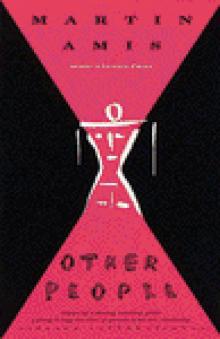 Other People
Other People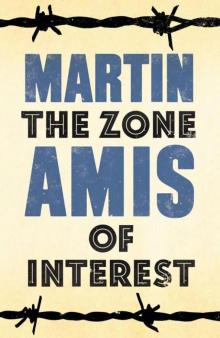 The Zone of Interest
The Zone of Interest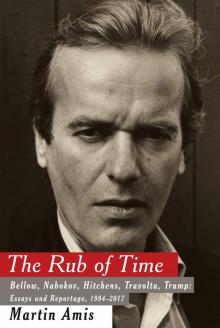 The Rub of Time: Bellow, Nabokov, Hitchens, Travolta, Trump
The Rub of Time: Bellow, Nabokov, Hitchens, Travolta, Trump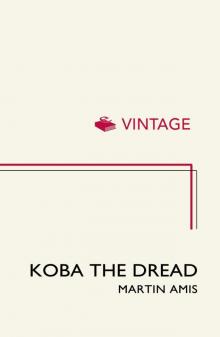 Koba the Dread
Koba the Dread Success
Success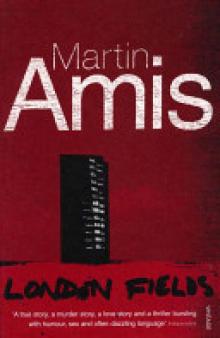 London Fields
London Fields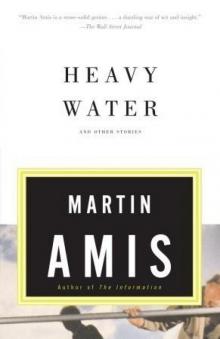 Heavy Water: And Other Stories
Heavy Water: And Other Stories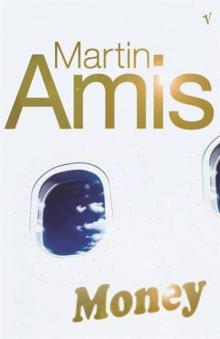 Money
Money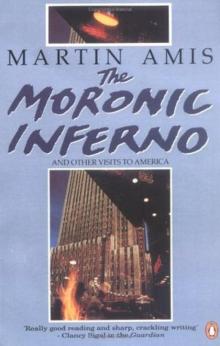 The Moronic Inferno and Other Visits to America
The Moronic Inferno and Other Visits to America Yellow Dog
Yellow Dog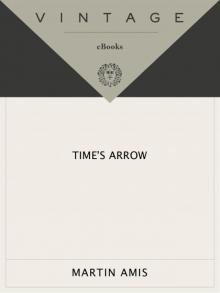 Time's Arrow
Time's Arrow Experience: A Memoir
Experience: A Memoir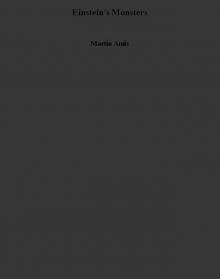 Einstein's Monsters
Einstein's Monsters The Pregnant Widow
The Pregnant Widow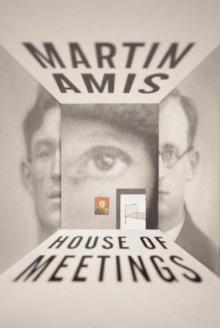 House of Meetings
House of Meetings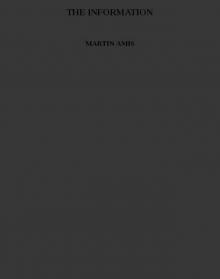 The Information
The Information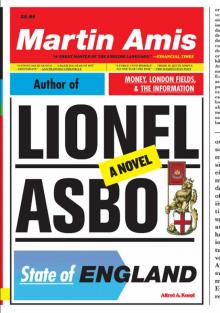 Lionel Asbo: State of England
Lionel Asbo: State of England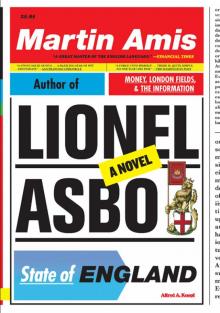 Lionel Asbo
Lionel Asbo Heavy Water and Other Stories
Heavy Water and Other Stories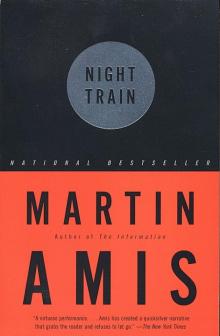 Night Train
Night Train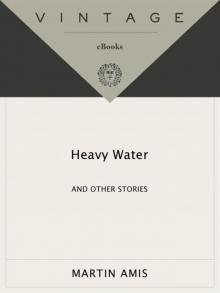 Heavy Water
Heavy Water The War Against Cliche: Essays and Reviews 1971-2000 (Vintage International)
The War Against Cliche: Essays and Reviews 1971-2000 (Vintage International)